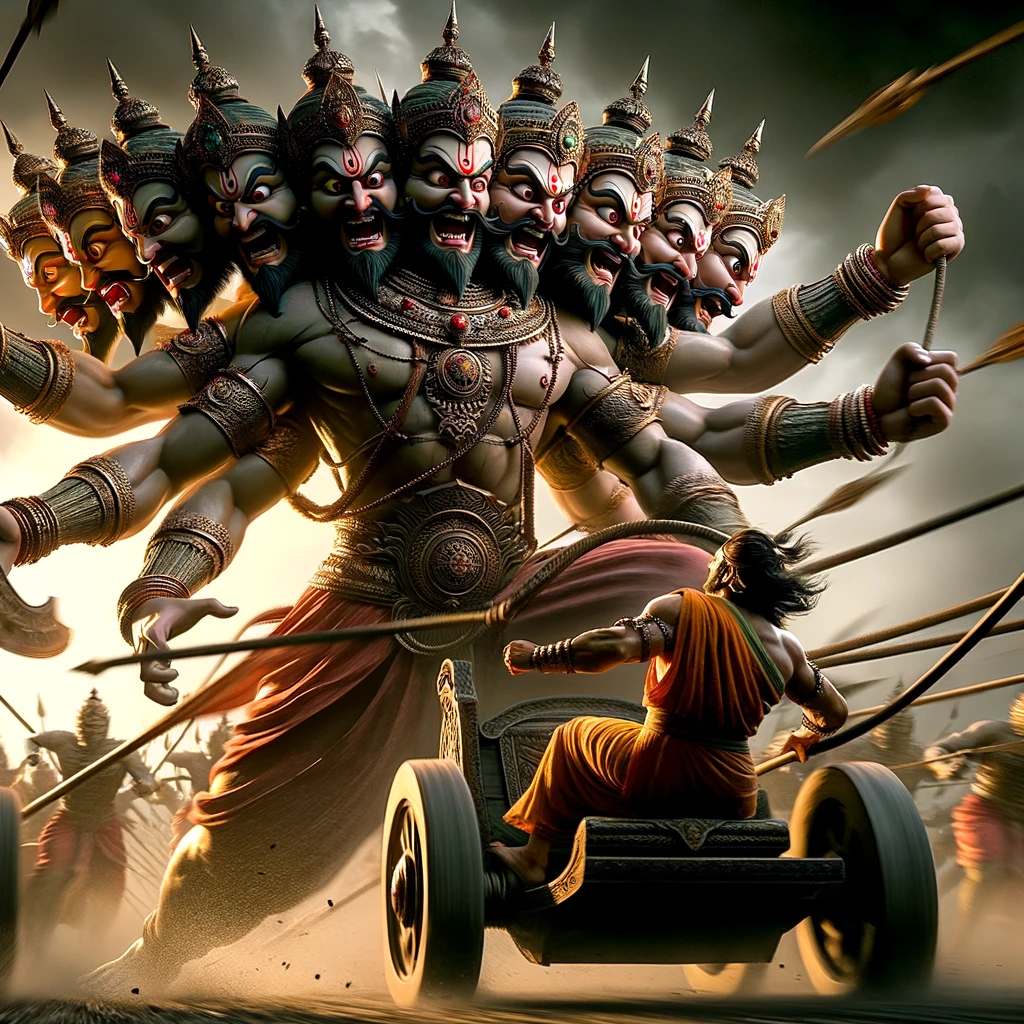Compelled by the force of destiny, Ravana, who was extremely angry and red in the eyes, spoke as follows to his charioteer, due to delusion: “Disdaining me, O fool, you act according to your own intelligence, thinking that I am deprived of valor, strength and manliness, or am cowardly, impotent, unenergetic, deprived of my magical powers and abandoned by my mystic weapons. Why did you remove this chariot of mine from the battlefield in view of the enemy, embarrassing me without ascertaining my desire? O ignoble one, you have destroyed my glory earned after a long time, my valor, energy and the faith which people have in me. While my enemy, whose prowess is well-known and who was eager for a display of valor, was watching, you made a fool of me, who was desirous of fighting. If out of delusion you fail to drive this chariot, my suspicion that you are influenced by the enemy will prove true. The deed you have done is surely not that of a well-wishing friend. It befits an enemy. If you have lived with me long enough and remember the benefits received from me, quickly drive the chariot back until the enemy does not approach me.”
When spoken to in this harsh manner by Ravana, the chariot, who was concerned about Ravana’s well-being, spoken the following kind and courteous words: “I was neither afraid nor bewildered, nor was I influenced by the enemy. I was not negligent, disloyal, nor forgetful of your favors. I performed an act unpleasing to you as something beneficial to you. With a mind devoted to affection, I wanted to do you some service and protect your glory. O great king, acting like a petty and ignoble person, you should not hold me, devoted as I am to your welfare, guilty in this matter. Listen, I will tell you why I brought your chariot back, as the force of a river is pushed back by a maritime tide. I noticed your exhaustion from combat. In fact, O warrior, you had no happiness or eagerness for fighting. The horses drawing the chariot were also exhausted. They were miserable and suffering heat exhaustion, like cows pelted with rain.
“Furthermore, if the omens appearing before us prove true, I see misfortune for us. The charioteer must ascertain the time and place, good and bad omens, facial expressions, depression, liveliness and exhaustion of the chariot warrior. He must know the rises and depressions of the earth, as well as its level and rugged areas, the time suitable for combat and the visible weak points of the enemy. When to advance and when to pull back, when to hold one’s own and when to retreat—all this should be known by a charioteer. I did this deed because of your exhaustion and that of the horses and to relieve that terrible fatigue. I did not remove the chariot whimsically, O lord. I did so out of affection for my master. Command me according to the facts, O crusher of enemies. With a mind free from debts, I shall do whatever you say.”
Satisfied with the charioteer’s explanation, Ravana thanked him fully and, desiring combat, spoke to him as follows: “O charioteer, quickly drive this chariot toward Rama. Ravana will not retreat from the battleground until he has killed his enemies.” When Ravana finished saying this, he gave a valuable shiny ornament for the hand to the charioteer sitting there. Hearing Ravana’s instruction, the charioteer returned to the battlefield. Compelled by Ravana’s order, the charioteer drove the horses forward so that Ravana’s huge chariot was on the battleground before Rama in a moment.
Thus completes 104th Chapter of Yuddha Kanda of the glorious Ramayana of Valmiki, the work of a sage and the oldest epic.
Sriman Moola Rama Vijayate


